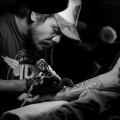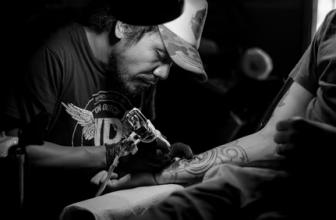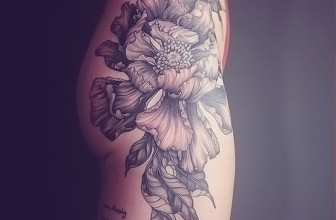How to Prepare for a Tattoo Apprenticeship
Aspiring tattooers will often learn under a professional tattoo artist through an apprenticeship.
Because tattooing is not only an art form and a procedure on the body, learning from a licensed tattoo artist makes it more likely for an aspiring artist to learn the correct way to tattoo and build a successful career.
Getting an apprenticeship is not an easy task, but knowing how to prepare for one can make it much easier to get your foot in the door.
To help, in this article we’ll be breaking down:
- What you need to know about the tattoo industry before getting an apprenticeship
- How to prepare a tattoo apprenticeship portfolio
- How to find a potential mentor and ask them to teach you
1. Understand the Tattoo Industry
Tattoo apprenticeships are considered the traditional route into the industry (as opposed to being self-taught), but they can make it difficult to support yourself financially. Apprentices work 1-4 years without pay, which is why most mentors favor younger apprentices who have fewer bills and responsibilities.
Tattoo Apprenticeship Red Flags
Most apprentices work long hours, experience hazing, and have to do menial tasks like cleaning and working the front desk. This is normal during your first year, since it’s unlikely you’ll pick up a tattoo machine during that time.
However, plenty of tattoo “apprentices” get tricked into working for free for years in an abusive environment. They’ll string artists along for the free labor and without teaching them anything.
2. Create a Tattoo Apprenticeship Portfolio

Your apprenticeship portfolio should include 15-20 of your best tattoo designs neatly placed in a folder with plastic sleeves or in a book. Most potential mentors will also want you to have a variety of tattoo styles (Traditional, Japanese, mandala, etc.).
Each piece in your portfolio should all be completely finished (no sketches or “ideas”).
3. Find a Potential Mentor and Get Tattooed by Them

Getting tattooed by a potential mentor makes it easier to get a tattoo apprenticeship.
Every artist will turn you down if you walk into a shop and ask for a tattoo apprenticeship. Instead, you can build a relationship with your potential mentor by getting tattooed by them. Showing that you value their work will go a long way when you bring up your tattooing goals.
How to Know if A Tattoo Artist Will be a Good Mentor
Not every tattoo artist is a good choice for a mentor. If you’re not sure if a potential mentor is a good fit, these two questions can help you:
Is their work at a level you’d be happy with?
A good mentor will teach you everything they know. However, that means your work will probably be at the same level as theirs.
If you decide to apprentice under an artist that is “okay” but not “good,” then your tattoos will also be “okay.” But if you pick a tattoo artist who is very skilled, then you can expect to learn the secrets behind those skills.
Have they had apprentices in the past? If so, what does their work look like?
If your potential mentor has taught several apprentices who went on to be successful tattoo artists, then it’s likely you would follow the same path.
If their apprentices were never able to produce good tattoos – or if they had a bad experience with that mentor, you should probably look for a different mentor.
4. Ask for An Apprenticeship the Right Way
Asking a tattoo artist to take you on as an apprentice is asking them to take on a huge responsibility. Instead, it’s better to ask your potential mentor to take a look at some of your artwork.
That will only cost them about five minutes. If they like your work, they might bring up an apprenticeship. If they think you can improve your drawing skills, make sure you keep drawing and that you implement their advice.
If you return with better artwork that shows you listened to them, it’ll be much easier to transition the conversation to a possible apprenticeship.
Becoming a Successful Tattoo Artist
Although apprenticing with an experienced tattoo artist isn’t the only way to get into the industry, it definitely provides some advantages when it comes to getting hands-on experience and landing your first job in a tattoo shop.
If you’re ready to get into the tattooing industry, ensuring that you’re financially ready for an apprenticeship, and that you have a strong portfolio will get you on your way to building your dream career!





